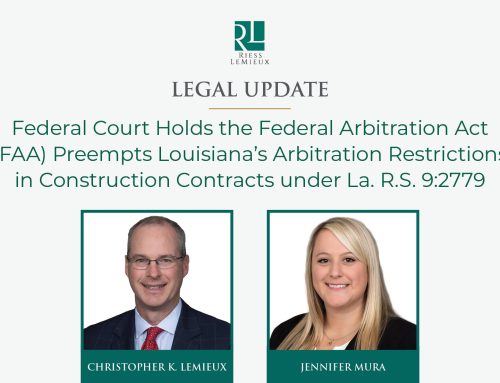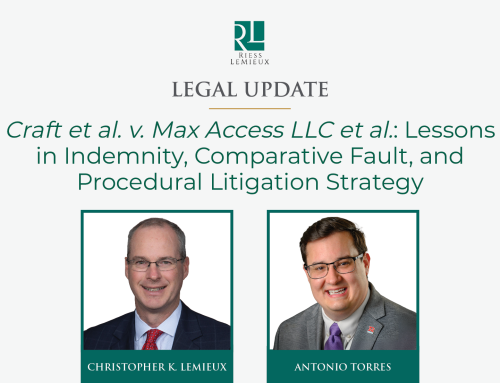
By: John W. Bihm
The Louisiana Supreme Court recently provided clarity in a muddled area of the Public Bid Law jurisprudence, holding that public bidding requirements that are inconsistent or in conflict with the Public Bid Law are invalid. Public entities have long advertised bidding requirements beyond the Public Bid Law requirements when they seek bids for public work projects. Since the Louisiana Supreme Court’s 2006 Hamp’s decision, it was clear public entities could not waive any advertised bidding requirement, even if considered insignificant, because the Public Bid Law expressly precludes waiving advertised bidding requirements. Thus, a bidder who failed to comply with an advertised bidding requirement could not be awarded a contract.
Over the years, the Louisiana legislature has attempted to restrict the documents that can be required on bid day, leading to a few additional questions of law, including: (1) whether an advertised bidding requirement that conflicts with the Public Bid Law is valid; and (2) whether an advertised bidding requirement that exceeds the requirements in the Public Bid Law, but does not conflict with it, is valid. The Louisiana Supreme Court answered at least the first question, and likely the second, in its recent decision in LeBlanc Marine, LLC v. State of Louisiana (No. 2019-0053), which reversed the lower courts.
The per curiam opinion begins by noting that “a public entity may not deviate from the statutory requirements.” However, a thorough examination of the opinion suggests the true holding is that advertised bidding requirements are valid if they merely exceed but do not conflict with the statutory requirements, but an advertised bidding requirement is not valid if it conflicts with a mandatory statutory requirement.
The parties in LeBlanc Marine stipulated that Southern Delta’s bid complied with one of the three options allowed by La. R.S. 38:2212 (B)(5) to prove a bidder’s agent had sufficient authority to sign its bid. Section 38:2212(B)(5) says “the authority of the signature of the person submitting the bid shall be deemed sufficient and acceptable if any of the following conditions are met . . . .” The legal dispute arose because, although Southern Delta complied with one of the options in Section 38:2212(B)(5) (i.e., the statutory requirement), its bid did not comply with the advertisement—namely, the Instructions to Bidders, which limited bidders to only two of the three Section 38:2212(B)(5) options to prove the agent’s authority. The State accepted Southern Delta’s bid; another bidder, LeBlanc Marine, sued to declare any contract with Southern Delta to be null.
The Louisiana Supreme Court found the advertised Instructions to Bidders conflicted with the mandatory statutory requirement contained in La. R.S. 38:2212(B)(5). The statute’s plain language (that any of the three options of proving the signatory’s authority “shall be deemed sufficient”) indicated it was mandatory. The advertised bidding requirement conflicted with the statutory requirement by permitting only two of the three statutory options as sufficient proof of the agent’s authority to sign. Thus, the advertised requirement was invalid because it exceeded and conflicted with a mandatory statutory requirement.



